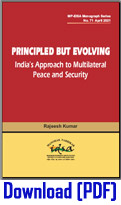Principled but Evolving: India’s Approach to Multilateral Peace and Security
- 2021 |
- Monograph
 India’s multilateral approach has been influenced and guided by multiple strategies, interests, values and has transformed significantly through the decades. However, most foreign policy scholars have argued that India has often acted like a “spoiler” or “rule-breaker” in multilateral negotiations. While offering a critique of the prevailing literature, the monograph attempts to answer one of the pertinent question: is there an Indian way of multilateralism? Analysing two cases, India’s engagement in UN Peacekeeping operations and its approach towards the Responsibility to Protect (R2P), the study argues that in the realm of international peace and security, India’s approach is principled but evolving.
India’s multilateral approach has been influenced and guided by multiple strategies, interests, values and has transformed significantly through the decades. However, most foreign policy scholars have argued that India has often acted like a “spoiler” or “rule-breaker” in multilateral negotiations. While offering a critique of the prevailing literature, the monograph attempts to answer one of the pertinent question: is there an Indian way of multilateralism? Analysing two cases, India’s engagement in UN Peacekeeping operations and its approach towards the Responsibility to Protect (R2P), the study argues that in the realm of international peace and security, India’s approach is principled but evolving.
About the Author
Dr Rajeesh Kumar is an Associate Fellow at MP-IDSA. He holds a Ph.D. in International Organization from Jawaharlal Nehru University. Before joining MP-IDSA, he taught post-graduate courses at Jamia Millia Islamia, New Delhi and University of Calicut, Kerala. Kumar’s book The International Committee of the Red Cross in Internal Armed Conflicts: Is Neutrality Possible was published by Palgrave Macmillan in 2019. He is also the co-editor of Eurozone Crisis and the Future of Europe: Political Economy of Further Integration and Governance (London: Palgrave Macmillan, 2014). His research papers and opinion pieces have appeared in leading publications including Strategic Analysis, India Quarterly, The Journal of Social, Political and Economic Studies, E-International Relations, The Diplomat, Japan Times, Tehran Times and The Outlook.
Keywords: Multilateralism




